人教版(2019)Unit 4 Journey Across a Vast Land Listening and Speaking 课件(共19张PPT,内镶嵌音频)
文档属性
| 名称 | 人教版(2019)Unit 4 Journey Across a Vast Land Listening and Speaking 课件(共19张PPT,内镶嵌音频) | 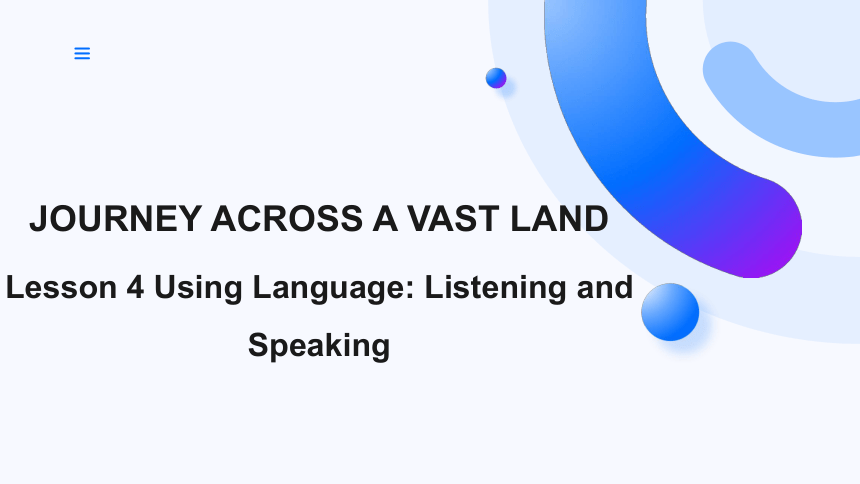 | |
| 格式 | pptx | ||
| 文件大小 | 4.7MB | ||
| 资源类型 | 教案 | ||
| 版本资源 | 人教版(2019) | ||
| 科目 | 英语 | ||
| 更新时间 | 2025-03-02 14:47:33 | ||
图片预览

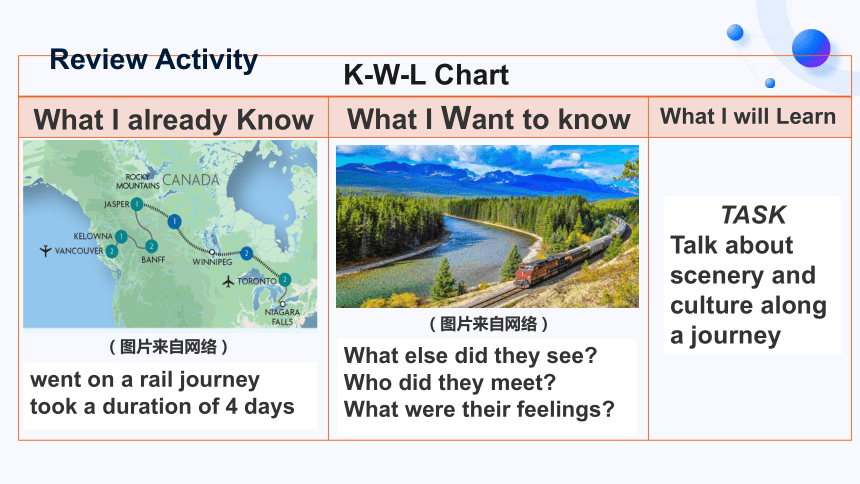
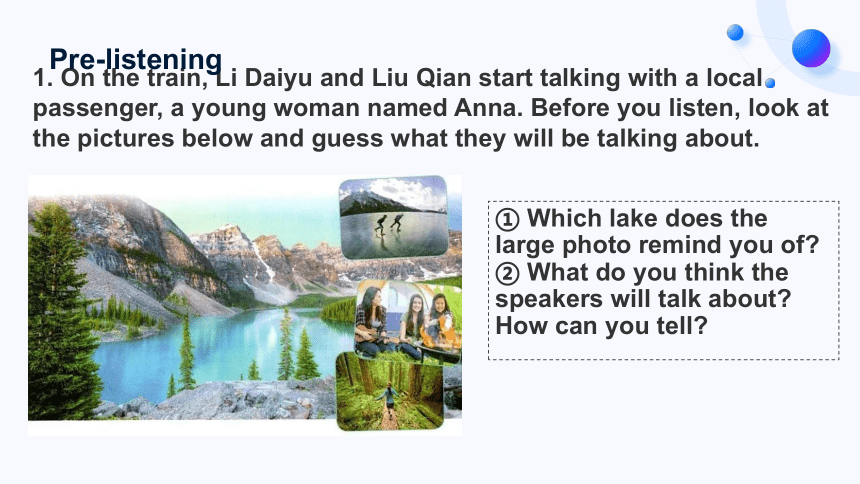
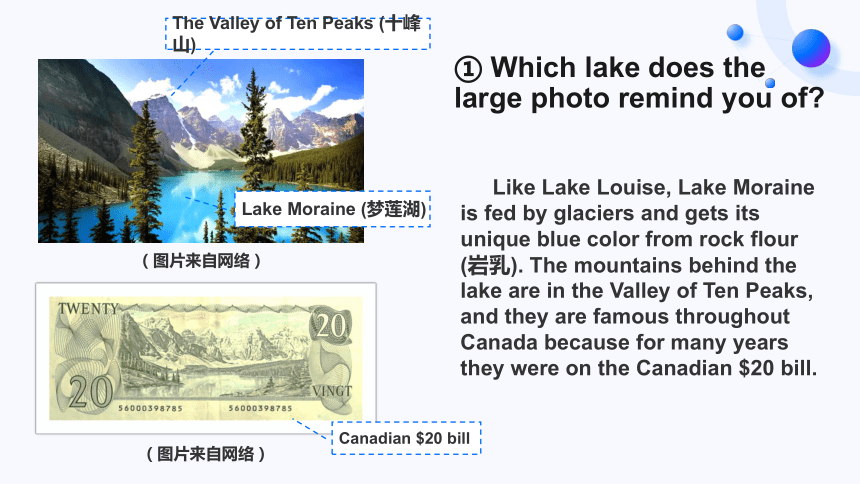
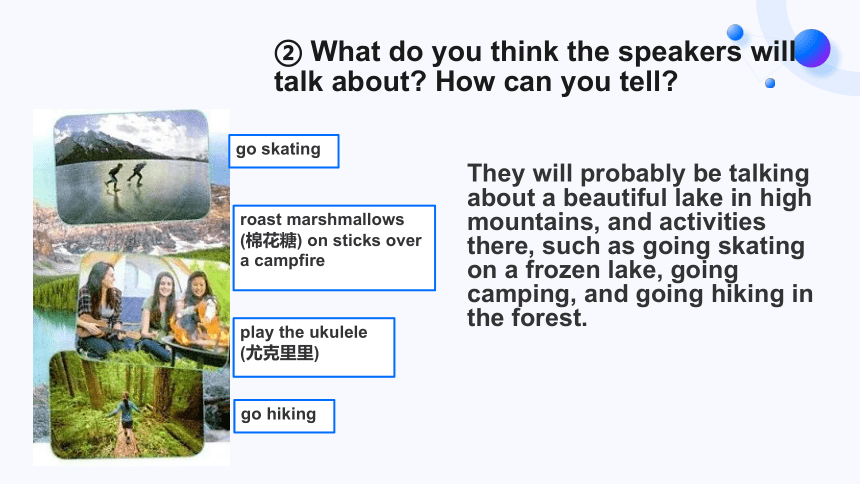
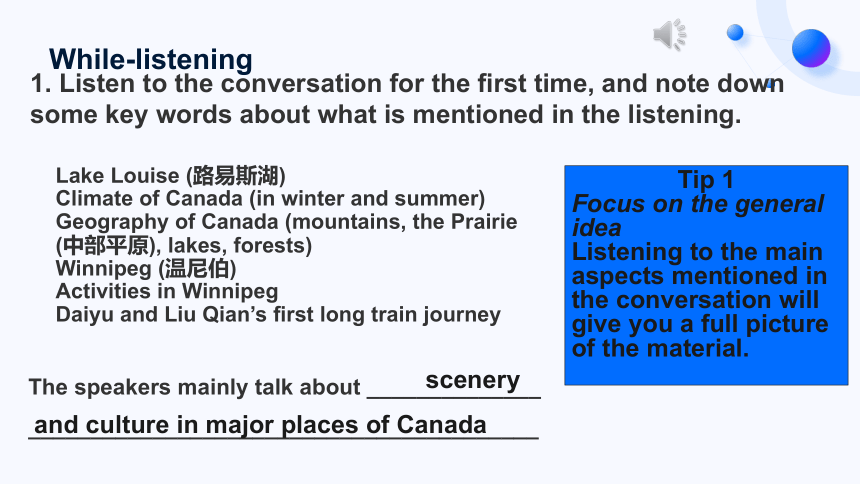
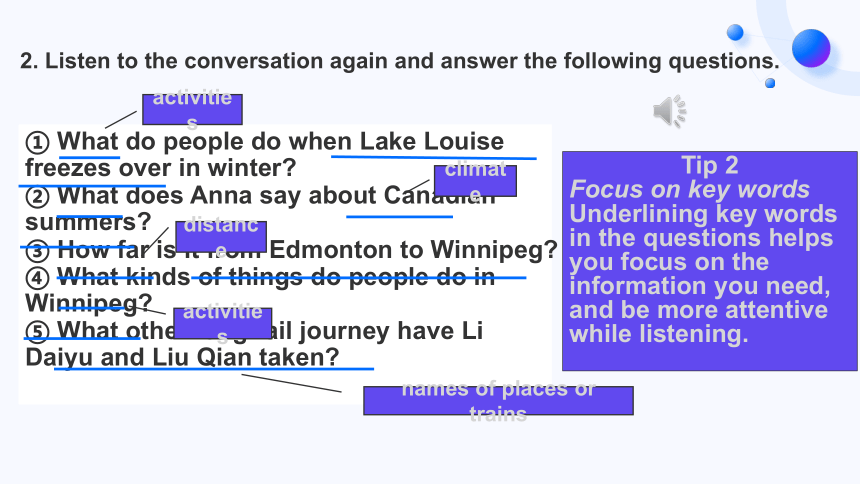
文档简介
(共19张PPT)
JOURNEY ACROSS A VAST LAND
Lesson 4 Using Language: Listening and Speaking
went on a rail journey
took a duration of 4 days
TASK
Talk about scenery and culture along a journey
What else did they see
Who did they meet
What were their feelings
What I will Learn
What I Want to know
K-W-L Chart
(图片来自网络)
(图片来自网络)
What I already Know
Review Activity
1. On the train, Li Daiyu and Liu Qian start talking with a local passenger, a young woman named Anna. Before you listen, look at the pictures below and guess what they will be talking about.
① Which lake does the large photo remind you of
② What do you think the speakers will talk about How can you tell
Pre-listening
① Which lake does the large photo remind you of
Lake Moraine (梦莲湖)
The Valley of Ten Peaks (十峰山)
Canadian $20 bill
Like Lake Louise, Lake Moraine is fed by glaciers and gets its unique blue color from rock flour (岩乳). The mountains behind the lake are in the Valley of Ten Peaks, and they are famous throughout Canada because for many years they were on the Canadian $20 bill.
(图片来自网络)
(图片来自网络)
② What do you think the speakers will talk about How can you tell
go skating
roast marshmallows (棉花糖) on sticks over a campfire
go hiking
play the ukulele (尤克里里)
They will probably be talking about a beautiful lake in high mountains, and activities there, such as going skating on a frozen lake, going camping, and going hiking in the forest.
1. Listen to the conversation for the first time, and note down some key words about what is mentioned in the listening.
Tip 1
Focus on the general idea
Listening to the main aspects mentioned in the conversation will give you a full picture of the material.
Lake Louise (路易斯湖)
Climate of Canada (in winter and summer)
Geography of Canada (mountains, the Prairie (中部平原), lakes, forests)
Winnipeg (温尼伯)
Activities in Winnipeg
Daiyu and Liu Qian’s first long train journey
The speakers mainly talk about ______________
_________________________________________
scenery and culture in major places of Canada
While-listening
2. Listen to the conversation again and answer the following questions.
① What do people do when Lake Louise freezes over in winter
② What does Anna say about Canadian summers
③ How far is it from Edmonton to Winnipeg
④ What kinds of things do people do in Winnipeg
⑤ What other long rail journey have Li Daiyu and Liu Qian taken
Tip 2
Focus on key words
Underlining key words in the questions helps you focus on the information you need, and be more attentive while listening.
activities
distance
activities
names of places or trains
climate
① What do people do when Lake Louise freezes over in winter
② What does Anna say about Canadian summers
Scripts: It’s even prettier in winter, after the lake freezes over. People like to go skating on the ice.
People like to go skating on the ice.
Many areas of south Canada have very hot summers.
Scripts: So then, Canada must have cool summers as well.
That’s certainly true of many places. However, many areas of south Canada have a continental climate (大陆性气候), with very hot summers and very cold winters, so some days it gets as hot as an oven.
③ How far is it from Edmonton to Winnipeg
④ What kinds of things do people do in Winnipeg
More than 1300 kilometers.
Scripts: In fact, by the time we get to Edmonton, we’ll be in the Prairie. This is as flat as a pancake and stretches for as far as the eye can see – more than 1,300 kilometers – until we reach Winnipeg.
Skiing, hiking, camping and city things like movies or restaurants on the weekends.
Scripts: What do you do to kill time there
Oh, you name it … skiing, hiking, camping. But also city things: movies or restaurants on the weekends, for example.
⑤ What other long rail journey have Li Daiyu and Liu Qian taken
They travelled from Beijing to Moscow on the Trans-Siberian Railway through Mongolia.
Scripts: So is this your first long train journey
Oh, no. Last autumn, we travelled from Beijing to Moscow on the Trans-Siberian Railway (西伯利亚大铁路) through Mongolia.
words fail me
as hot as an oven
as flat as a pancake
as far as the eye can see
dead center
kill time
you name it
A with no mountains or hills
B all kinds of things
C for a long distance
D I’m surprised
E spend time
F very warm
G the exact middle of something
无话可说
热如火炉
平如煎饼
目之所及
正中心
消磨时间
应有尽有
Tip 3
Understand idioms
Idioms are often used in the English language. The meanings of some can be guessed. However, many others need to be studied and remembered.
3. Listen again. Match the following idioms and similes with their meanings.
Try to paraphrase the sentences with definitions of the idioms on the right column. What impressions do the sentences make with the idioms
① It’s so beautiful! Words fail me.
It’s so beautiful! I’m surprised.
② This is as flat as a pancake and stretches for as far as the eye can see.
There are no mountains or hills on the Prairie which stretches for a long distance.
③ It’s a small city almost in the dead center of North America.
It’s a small city almost in the exact middle of North America.
④ What do you do to kill time
What do you do to spend time
Idioms often use figures of speech such as simile (明喻), metaphor (暗喻), exaggeration (夸张), personification (拟人) to make your speech more vivid and concise (简洁的).
1. In groups of three, continue the conversation about Canada and China based on your own travel experience or the information you heard or read in this unit. End the conversation naturally.
① How does Anna start to talk about China
② How do they end the conversation and say goodbye
③ What will be talked about in the middle of the conversation
Anna: I thought China would be very crowded, given its large
population.
Daiyu: Well, contrary to what many people believe, there are a lot
of vast and empty spaces in China, actually.
Anna: That’s great! There must be amazing scenery to see in
China then!
…
Anna: Anyhow, the next station is my stop! Take care and enjoy
the rest of your trip.
Daiyu: Thanks, Anna.
Liu Qian: It was really great to meet you!
Anna: And it was nice talking to you!
?
Post-listening
2. Make an outline of a journey taken by you across a vast land in China, and supplement (补充) the information with your group members.
A journey across a vast land in China Place
Transportation
Population
Climate
Geography
Amazing scenery
Activities
Similarities and differences between China and Canada
…
Tibet西藏
(图片来自网络)
A journey across a vast land in China Place Tibet
Transportation Travel south across Kunlun Mountains; a special oxygen supply on train
Population Sparsely-populated (人口稀疏)
Climate Cold in winter; still covered in snow in summer
Geography Tibetan Plateau (西藏高原); Vast and empty spaces
Amazing scenery Wide river valleys, high mountains, heavy forests, open grasslands; wild animals; antelopes; snow leopards
Activities Local Kazak (哈萨克) folk customs
Big gathering with ethnic characteristics – horse racing
Similarities and differences between China and Canada High mountains and vast plain, beautiful scenery.
Sample Work
3. Now it is your turn to make a conversation with your partners. The useful expressions below will help you.
Talking about space and position
Oh, my goodness!/Good heavens!
You’re kidding!
Are you kidding
Are you serious
It can’t be true!
Expressing surprise and curiosity
It’s about … kilometers northeast of …
… is close to
in/on/to the north/south/west/east of …
across the continent/lake
alongside the coast/river
go eastwards/westwards/northwards/southwards
Ending a conversation naturally
I have to run. Good talking to you.
I’ll catch you later.
It was good/nice meeting you.
I’m sure you want to relax a bit. I’ll let you go.
Sorry, I can’t talk longer. I’m actually on my way to …
Well, I have to go. I’ll talk to you later.
Oh no! Really
What a surprise!
I think it’s fantastic!
Wow! How interesting/amazing!
What was it like
Cover important details about the cousins’ trip. (the cousins)
Show surprise and curiosity to the experiences properly. (Anna)
Use appropriate idioms learnt from the listening material and use appropriate expressions as suggested.
Organize the conversation logically by using connectors.
Speak fluently with the right tone.
4. While preparing, refer to the following points of attention.
Assessment
In this lesson, we have:
learned about the scenery and culture along the journey across Canada;
practised listening skills such as predicting, listening for gist and details;
learned about the meanings and functions of some idioms based on the context;
applied what we have learnt to make a conversation about a journey across a vast land in China.
Summary
1. Continue the conversation about a journey across a vast land in China.
2. Make sentences with the seven idioms learnt in the lesson, and try to find out more commonly used idioms.
3. Preview the lesson on P43-45.
Homework
JOURNEY ACROSS A VAST LAND
Lesson 4 Using Language: Listening and Speaking
went on a rail journey
took a duration of 4 days
TASK
Talk about scenery and culture along a journey
What else did they see
Who did they meet
What were their feelings
What I will Learn
What I Want to know
K-W-L Chart
(图片来自网络)
(图片来自网络)
What I already Know
Review Activity
1. On the train, Li Daiyu and Liu Qian start talking with a local passenger, a young woman named Anna. Before you listen, look at the pictures below and guess what they will be talking about.
① Which lake does the large photo remind you of
② What do you think the speakers will talk about How can you tell
Pre-listening
① Which lake does the large photo remind you of
Lake Moraine (梦莲湖)
The Valley of Ten Peaks (十峰山)
Canadian $20 bill
Like Lake Louise, Lake Moraine is fed by glaciers and gets its unique blue color from rock flour (岩乳). The mountains behind the lake are in the Valley of Ten Peaks, and they are famous throughout Canada because for many years they were on the Canadian $20 bill.
(图片来自网络)
(图片来自网络)
② What do you think the speakers will talk about How can you tell
go skating
roast marshmallows (棉花糖) on sticks over a campfire
go hiking
play the ukulele (尤克里里)
They will probably be talking about a beautiful lake in high mountains, and activities there, such as going skating on a frozen lake, going camping, and going hiking in the forest.
1. Listen to the conversation for the first time, and note down some key words about what is mentioned in the listening.
Tip 1
Focus on the general idea
Listening to the main aspects mentioned in the conversation will give you a full picture of the material.
Lake Louise (路易斯湖)
Climate of Canada (in winter and summer)
Geography of Canada (mountains, the Prairie (中部平原), lakes, forests)
Winnipeg (温尼伯)
Activities in Winnipeg
Daiyu and Liu Qian’s first long train journey
The speakers mainly talk about ______________
_________________________________________
scenery and culture in major places of Canada
While-listening
2. Listen to the conversation again and answer the following questions.
① What do people do when Lake Louise freezes over in winter
② What does Anna say about Canadian summers
③ How far is it from Edmonton to Winnipeg
④ What kinds of things do people do in Winnipeg
⑤ What other long rail journey have Li Daiyu and Liu Qian taken
Tip 2
Focus on key words
Underlining key words in the questions helps you focus on the information you need, and be more attentive while listening.
activities
distance
activities
names of places or trains
climate
① What do people do when Lake Louise freezes over in winter
② What does Anna say about Canadian summers
Scripts: It’s even prettier in winter, after the lake freezes over. People like to go skating on the ice.
People like to go skating on the ice.
Many areas of south Canada have very hot summers.
Scripts: So then, Canada must have cool summers as well.
That’s certainly true of many places. However, many areas of south Canada have a continental climate (大陆性气候), with very hot summers and very cold winters, so some days it gets as hot as an oven.
③ How far is it from Edmonton to Winnipeg
④ What kinds of things do people do in Winnipeg
More than 1300 kilometers.
Scripts: In fact, by the time we get to Edmonton, we’ll be in the Prairie. This is as flat as a pancake and stretches for as far as the eye can see – more than 1,300 kilometers – until we reach Winnipeg.
Skiing, hiking, camping and city things like movies or restaurants on the weekends.
Scripts: What do you do to kill time there
Oh, you name it … skiing, hiking, camping. But also city things: movies or restaurants on the weekends, for example.
⑤ What other long rail journey have Li Daiyu and Liu Qian taken
They travelled from Beijing to Moscow on the Trans-Siberian Railway through Mongolia.
Scripts: So is this your first long train journey
Oh, no. Last autumn, we travelled from Beijing to Moscow on the Trans-Siberian Railway (西伯利亚大铁路) through Mongolia.
words fail me
as hot as an oven
as flat as a pancake
as far as the eye can see
dead center
kill time
you name it
A with no mountains or hills
B all kinds of things
C for a long distance
D I’m surprised
E spend time
F very warm
G the exact middle of something
无话可说
热如火炉
平如煎饼
目之所及
正中心
消磨时间
应有尽有
Tip 3
Understand idioms
Idioms are often used in the English language. The meanings of some can be guessed. However, many others need to be studied and remembered.
3. Listen again. Match the following idioms and similes with their meanings.
Try to paraphrase the sentences with definitions of the idioms on the right column. What impressions do the sentences make with the idioms
① It’s so beautiful! Words fail me.
It’s so beautiful! I’m surprised.
② This is as flat as a pancake and stretches for as far as the eye can see.
There are no mountains or hills on the Prairie which stretches for a long distance.
③ It’s a small city almost in the dead center of North America.
It’s a small city almost in the exact middle of North America.
④ What do you do to kill time
What do you do to spend time
Idioms often use figures of speech such as simile (明喻), metaphor (暗喻), exaggeration (夸张), personification (拟人) to make your speech more vivid and concise (简洁的).
1. In groups of three, continue the conversation about Canada and China based on your own travel experience or the information you heard or read in this unit. End the conversation naturally.
① How does Anna start to talk about China
② How do they end the conversation and say goodbye
③ What will be talked about in the middle of the conversation
Anna: I thought China would be very crowded, given its large
population.
Daiyu: Well, contrary to what many people believe, there are a lot
of vast and empty spaces in China, actually.
Anna: That’s great! There must be amazing scenery to see in
China then!
…
Anna: Anyhow, the next station is my stop! Take care and enjoy
the rest of your trip.
Daiyu: Thanks, Anna.
Liu Qian: It was really great to meet you!
Anna: And it was nice talking to you!
?
Post-listening
2. Make an outline of a journey taken by you across a vast land in China, and supplement (补充) the information with your group members.
A journey across a vast land in China Place
Transportation
Population
Climate
Geography
Amazing scenery
Activities
Similarities and differences between China and Canada
…
Tibet西藏
(图片来自网络)
A journey across a vast land in China Place Tibet
Transportation Travel south across Kunlun Mountains; a special oxygen supply on train
Population Sparsely-populated (人口稀疏)
Climate Cold in winter; still covered in snow in summer
Geography Tibetan Plateau (西藏高原); Vast and empty spaces
Amazing scenery Wide river valleys, high mountains, heavy forests, open grasslands; wild animals; antelopes; snow leopards
Activities Local Kazak (哈萨克) folk customs
Big gathering with ethnic characteristics – horse racing
Similarities and differences between China and Canada High mountains and vast plain, beautiful scenery.
Sample Work
3. Now it is your turn to make a conversation with your partners. The useful expressions below will help you.
Talking about space and position
Oh, my goodness!/Good heavens!
You’re kidding!
Are you kidding
Are you serious
It can’t be true!
Expressing surprise and curiosity
It’s about … kilometers northeast of …
… is close to
in/on/to the north/south/west/east of …
across the continent/lake
alongside the coast/river
go eastwards/westwards/northwards/southwards
Ending a conversation naturally
I have to run. Good talking to you.
I’ll catch you later.
It was good/nice meeting you.
I’m sure you want to relax a bit. I’ll let you go.
Sorry, I can’t talk longer. I’m actually on my way to …
Well, I have to go. I’ll talk to you later.
Oh no! Really
What a surprise!
I think it’s fantastic!
Wow! How interesting/amazing!
What was it like
Cover important details about the cousins’ trip. (the cousins)
Show surprise and curiosity to the experiences properly. (Anna)
Use appropriate idioms learnt from the listening material and use appropriate expressions as suggested.
Organize the conversation logically by using connectors.
Speak fluently with the right tone.
4. While preparing, refer to the following points of attention.
Assessment
In this lesson, we have:
learned about the scenery and culture along the journey across Canada;
practised listening skills such as predicting, listening for gist and details;
learned about the meanings and functions of some idioms based on the context;
applied what we have learnt to make a conversation about a journey across a vast land in China.
Summary
1. Continue the conversation about a journey across a vast land in China.
2. Make sentences with the seven idioms learnt in the lesson, and try to find out more commonly used idioms.
3. Preview the lesson on P43-45.
Homework
